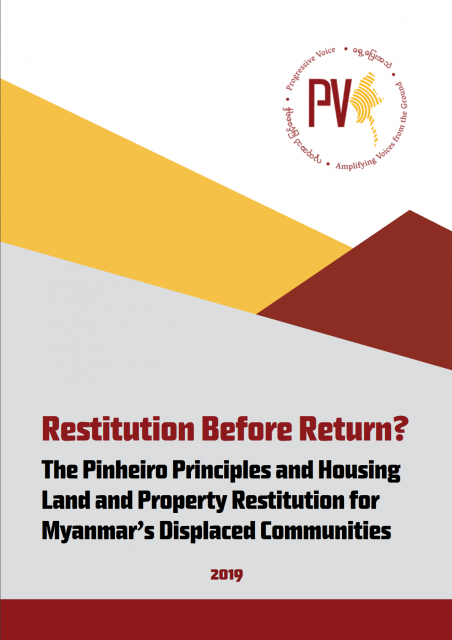Restitution Before Return? – The Pinheiro Principles and Housing Land and Property Restitution for Myanmar’s Displaced Communities


This briefing paper is a summary of the UN Principles on Housing and Property Restitution for Refugees and Displaced Persons (the Pinheiro Principles) and how they relate to the context of Myanmar, referencing two case study examples – Colombia and Sri Lanka. The Pinheiro Principles are particularly relevant to Myanmar as armed conflict over several decades has left hundreds of thousands of people as internally displaced persons (IDPs) or refugees. Fragile ceasefires in southeast Myanmar, where a substantial amount of ethnic Karen, as well as Mon, Karenni, Shan, and Burman had to flee their homes, has facilitated a narrative of return for refugees, despite fears over human security, livelihoods, and access to essential health and education services. Meanwhile, active conflict in the north of the country, especially Kachin and northern Shan States, displaces more people by the day.
This briefing paper thus argues that one of the key elements of sustainable and peaceful refugee/IDP return is the promotion and protection of returnees’ housing, land and property (HLP) rights, including restitution for lost land and property, as outlined in the Pinheiro Principles. This is not to say that the Pinheiro Principles are a panacea for the full restoration of HLP rights, let alone human security, as the implementation of the policies that adhere to the Pinheiro Principles must go hand-in-hand with comprehensive land reform that includes the protection of customary land use systems practiced by many communities in eastern Myanmar. Yet the Pinheiro Principles do provide an internationally recognized standard for incorporating IDP and refugees’ rights to restitution in any return process.
Download full report in English.
Download full report in Burmese.
၎
င
၎
၎
၎
င
၎
၎

